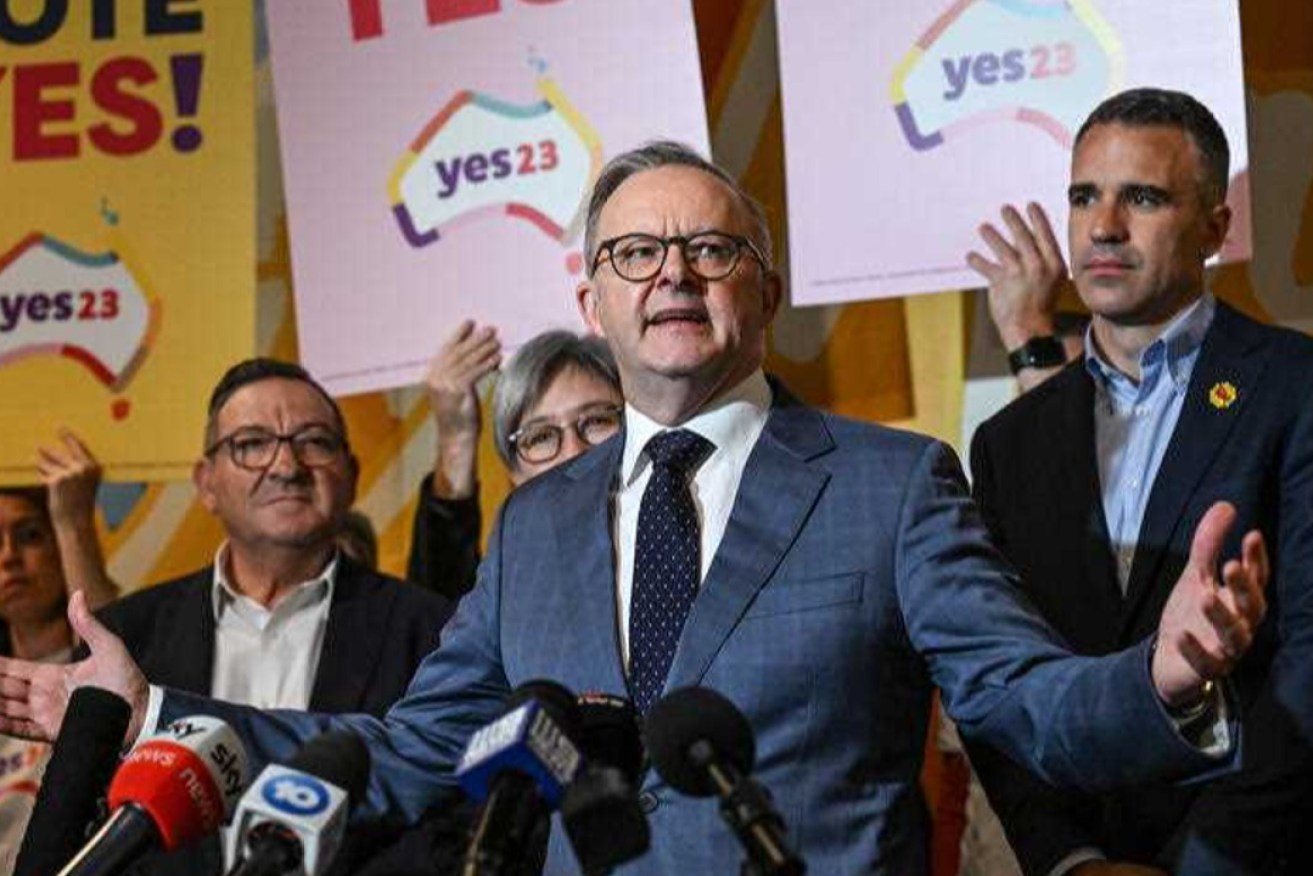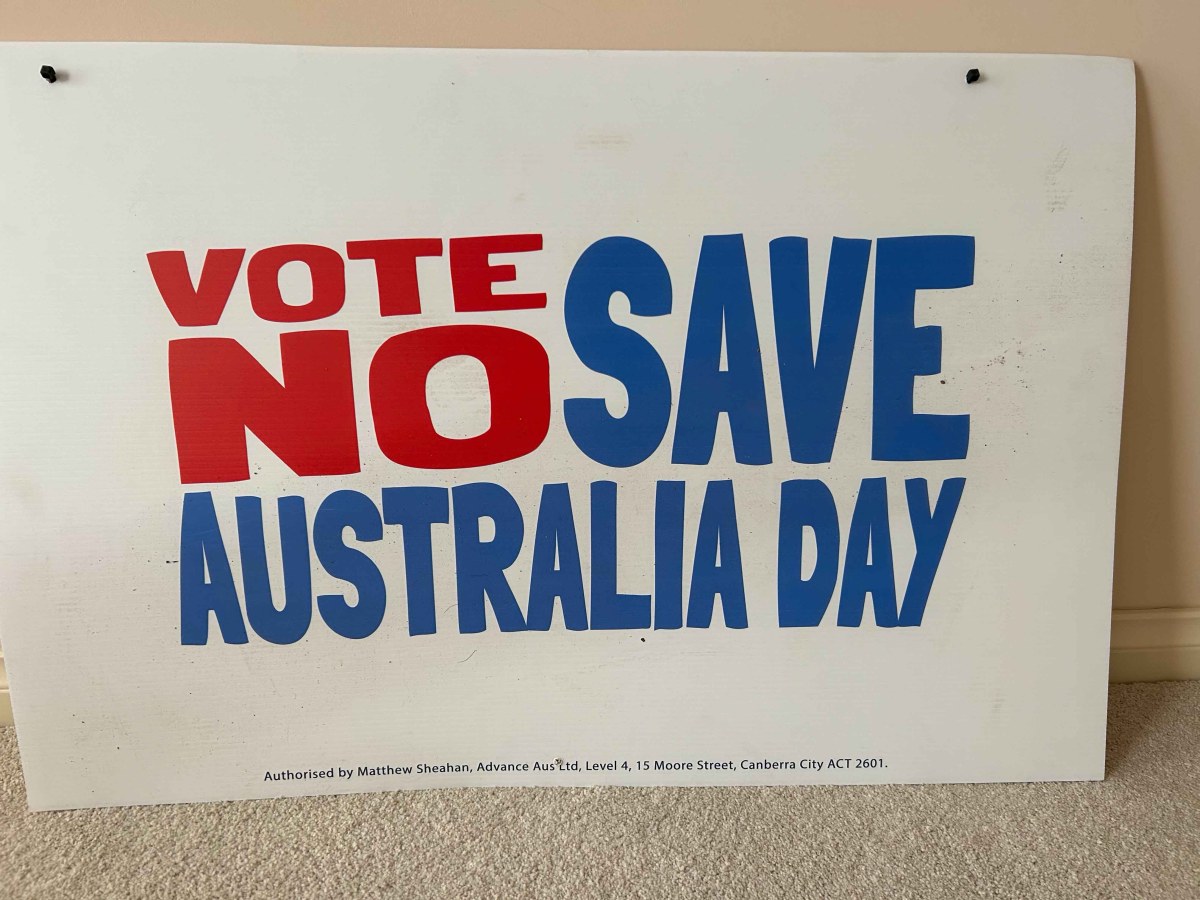Predicting the result in a vote with no real winners
As the gruelling referendum campaign comes to a close, Matthew Abraham takes a last look at the polls, including some data mostly ignored by the media.


Australian Prime Minister Anthony Albanese (centre) and South Australian Premier Peter Malinauskas (right) during a visit to Adelaide Central Market othis morning. Photo: AAP Image/Michael Errey
It will soon be all over bar the shouting.
By roughly 8pm on Saturday night, ABC election analyst Antony Green will be well placed to call the result of the nation’s first referendum since the failed republic proposition 24 years ago.
Most political hard heads already know the result. It won’t be a cliff-hanger.
If every mainstream opinion poll is correct the voice referendum will fail. Not just by a small margin, but a crushing defeat.
The 1999 referendum on whether Australia should become a republic went down the gurgler by a margin of 1,137,763 votes.
It was rejected by almost 55 per cent of the 11.6 million Australians who voted.
If the voice goes down by that margin, Prime Minister Anthony Albanese might count himself lucky, because the tea leaves are all pointing to a worse fate for the voice.
I had been expecting the cumulative downward curve of the Yes vote to level off and claw back some territory in the closing days of a campaign that has simmered for 15 months but officially began a rolling boil six weeks ago.
When the referendum wording was first floated by the PM in July last year, it enjoyed a 70 per cent approval rating. Since then, it’s flipped almost 180 degrees.
Now in the final week, it hasn’t even shown signs of a dead cat bounce – a cruel share market term for a small, short-lived recovery in stocks.
The Newspoll published by The Australian on Monday shows support has dropped another two points – with Yes trailing No 34 per cent to 58 per cent, and the “don’t knows” down to just 8 per cent.

The scare campaign for No has been simple and brutally effective.
Removing the “don’t knows” from the equation paints an even starker picture for the Yes camp – 37 to 63.
The newspaper’s political editor Simon Benson says the numbers show “there is now not a single demographic category in which the Yes vote outnumbers the No case”.
Two statistics leapt from the broadsheet – the biggest decline was among Labor voters and the number of 18 to 34-year-olds saying they intend to vote No rose eight points to 49 per cent.
These two categories point to why the Yes case is headed for almost certain defeat because the younger demographic and the true believers were meant to bring home the bacon for a voice to parliament.
Bear with me for one final poll – an unexpected entry to a crowded polling space that received little mainstream media attention.
This one was run from across the seas in Mother England.
UK polling outfit Focaldata revealed a week ago it had polled some 4600 people in “the largest public poll of the campaign”, with the exception of the local YouGov poll.
With typical British understatement, it reports the result “looks comprehensive for No at 61/39”.
The firm’s chief research officer James Kanagasooriam said a breakdown of the data showed it looks like only 22 of the nation’s 151 federal seats will back a Yes vote.
In brief, he sees the No vote winning every state and 85 per cent of the nation’s electorates.
A referendum to change the Australian constitution demands a majority of four states and a majority of the total voting population – the booby trap hiding in plain sight that makes constitutional reform such a big ask, particularly without solid, bipartisan support.
Back in July, in this space, I wrote that something had to change with the Yes campaign because on so many levels it looked like a calamity.
This is because it was happy preaching to the converted, the messaging was fuzzy and its leaders needed to lose the disapproving, finger-wagging body language from their podiums.
It was an observation made from reporting on dozens of state and federal election campaigns that ended in train wrecks.
Almost three months of increasingly bitter campaigning later, and nothing has changed that view.
If the Yes vote miraculously limps across the line on Saturday night, it won’t be due to some master strategy by the Yes camp.
Any victory will be down to a last-minute outburst of hidden love from wavering voters.
Money helps to win political campaigns, and the Yes camp reportedly had $100 million in the kitty, although how they’ve spent it is a mystery.
Celebrity endorsements can help and the Yes campaign has more A-listers on board than the red carpet at the Logies.
During the week, Premier Peter Malinauskas posed with Indigenous footballers backing the voice.
He loves his happy snaps with footy greats, but our Premier would be better off spending time in the state’s remote APY lands, where some Indigenous voters interviewed by ABC news this week knew diddly squat about the voice.
And, of course, big corporations like Qantas have endorsed the voice, throwing millions into the Yes campaign coffers. At a time of crushing cost-of-living blows, the Big End of Town hasn’t woken up to the fact many Australian consumers aren’t impressed by their frolics into social agendas.
It’s puzzling that journalists so often place so little faith in the expensive and well-run polling conducted for their own news outfits.
On Monday, I found myself at the end of a long queue waiting to have our groceries scanned by the one checkout operator on deck.
The bloke in front of me, clutching a loaf of bread and a bunch of asparagus, turned around and said: “$1.6 billion profit this year and this is how they treat us”.
He was last seen walking toward the self-serve area, where he’d be monitored by the in-store CCTV cameras, because they think we’re all thieves.
What this referendum campaign has shown is that you can’t beat a simple message.
The No campaign’s “If you don’t know, vote no” mantra has proved devastating.
Just for good measure, Advance Australia No vote corflutes that will festoon polling booths on Saturday will include “Vote No. Save Australia Day”.
Like Bart Simpson’s Grandpa shouting at the clouds, the ALP has spent weeks moaning about the unfairness of the messaging without landing a punch.
Two final thoughts: The dreadful Hamas attack on Israel, and the ugliness seen on the steps of Sydney’s Opera House, have crowded the important final week of the voice debate.
In a perverse way, it plays into the No proponents’ deliberately unsettling scare campaign about the “voice of division”.
And if the referendum fails to deliver a federal voice, an understandably angry fallout has implications for South Australia’s legislated voice to parliament.
It was initially touted as a template for the nation but was parked as the Malinauskas Government said it might “distract” from the federal campaign. The SA voice may now face a tricky path from legislation to reality.
Now for some predictions. My undeserved reputation for calling election results in advance is built on a simple strategy – follow the opinion polls.
It’s puzzling that journalists so often place so little faith in the expensive and well-run polling conducted for their own news outfits.
Based on the opinion polls published this week, it’d make sense to rely on the proven formula and tip a 63-37 victory for the no vote.
But what if the pollsters are over-egging the pudding?
My prediction is the Yes case may close the gap, as it were, but No will win comfortably by 56 pc to 44 pc.
The voice will lose in every state and fail to win a national majority of all voters.
Despite a relatively smooth passage of the legislated SA voice, my guess is our state will give a thumbs down to a national, constitutional voice, with No winning here by 59 to 41.
Winners are grinners they say. But unless we somehow heal the ugly wounds opened by this campaign, there’ll be no winners and fewer grinners after Saturday night.
Matthew Abraham is InDaily’s political columnist. Matthew can be found on Twitter as @kevcorduroy. It’s a long story.




